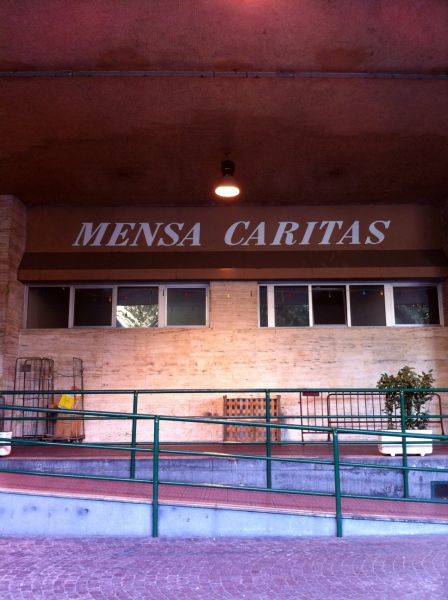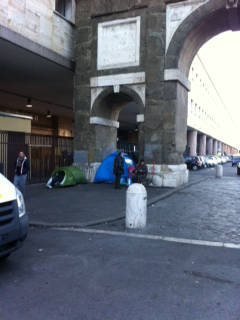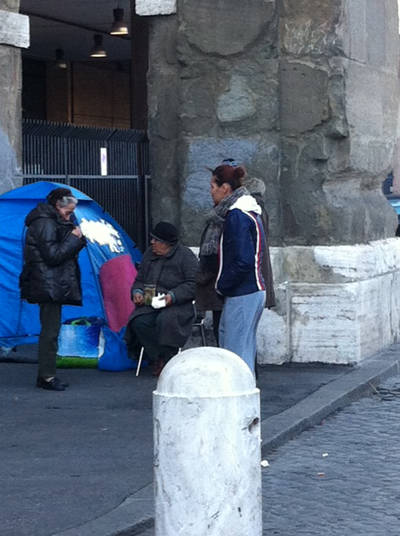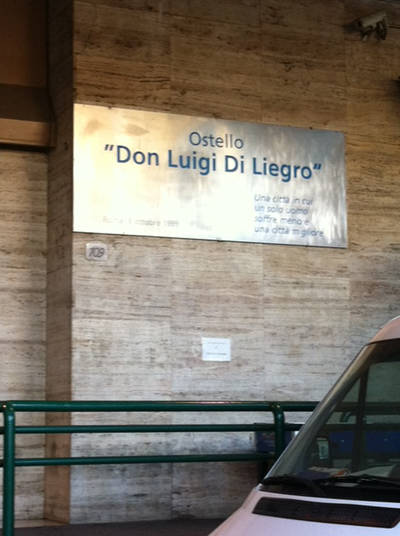New Paupers of Italy
December 25, 2011: What will Christmas be like for Italians this year? What about the many people who are facing difficult times and great need but who are not able to sit in their own homes, at their own dinner tables, and share the most important meal of the year with loved ones?
We went to Termini Station in Rome where you will find them in the soup kitchen, the homeless shelter, and the Don Luigi Di Liegro health clinic run by Caritas. On the wall at the entrance the sign reads: “A city where one man suffers a little less is a better city.” These are the words of Don Luigi Di Liegro, founder of Caritas, who died in 1997 after spending his entire life fighting all forms of exclusion, always at the service of the poorest. This is one of the places where in the past illegal immigrants, the marginalized, and many Italians who had to fight for survival could find shelter and a blanket for warmth as well as a doctor, a bathroom, and a barber. Here it will be Christmas even for those who are ignored, unseen, unwanted, and who live on the margins of society. It will be Christmas for a new category of people, the so-called “new poor,” ordinary people, recently retired workers, women with downcast eyes who are ashamed, the unemployed, separated fathers who can’t make ends meet until the end of the month.
We see them in front of the soup kitchen and they ask us not to be photographed, but they agree to tell their stories. There are those who after a meal can take home a sandwich or a piece fruit. Others have no permanent place to live and sleep wherever they can: benches, porches, under bridges. There are also forty and fifty year olds, who along the old men, rummage through the scraps at local markets.
Giovanna, 53, tells a story similar to those of her new friends at Caritas: “I come here to eat because two years ago I lost my job. I had a grocery store in the suburbs. At one point they opened a large mall that literally killed me. I had to close; I wasn’t selling anything. I looked for work for a while, but at my age no one wants me. I was living off my life savings, but now that’s gone. I don’t have a family, I am alone. I sleep at the station, those few hours that I can. There, at least, they leave you alone. Even if there’s no heat, at least we’re protected. My Christmas? I’ll be here at Caritas. A day like any other. The menu will change; it will be different than other days, but my life will always be the same.”
Next to her is Stephen, 45, a separated father. “I just went through a divorce that ruined me. My life has gone downhill. I lost my house, I lost my children, my salary was cut and now with this economic crisis, I suffered one final blow: I lost my job. And what little I had left went with it. I was no longer able to pay rent for a room and I made the decision to live on the street. Fortunately, the judge excused me from child support which I could no longer pay.”
As he speaks, his hands shake nervously. “I feel really depressed. I come here for lunch almost every day, hoping that sooner or later things will change. For now I spend the day running around looking for a job and then I come here to spend the night at the station, on the benches. My Christmas will be sad because I can’t be with my children. I cannot afford to take them out like I did before. My wife has a partner, another life. I am alone.”
Claudio, 60, also unemployed, explains: “I’m too old to work and too young to retire. Now with Monti’s plans and the pension cuts, I’m desperate. My future is in the middle of the street. If I had hope before, to be able to retire within two or three years with years of work I had put in, now who knows if I’ll make it. The thing that makes me angry is that on Christmas Day they’ll mention us on television, they’ll talk to us, they’ll interview us. And then what? End of story. There won’t be another word about us until next Christmas.”
We move to Colle Oppio where there is another soup kitchen run by Caritas that’s always crowded with hundreds of desperate people. They sleep in the gardens right in front, steps from the Coliseum but light years away from Rome’s tourists. We see a bunch of people outside the entrance. They also agreed to speak to us but asked not to be photographed. Salvatore, in his sixties, said he worked as a cook as long as he could. Then because of a serious, debilitating illness he had to stop. His only salvation is help from Caritas and the various associations that help people like him.
“Since January with the budget cuts,” he explains, “it’s no longer possible to take two showers a week like we used to here. There is more money for us. On Christmas Day perhaps the pope or the mayor might come to the soup kitchen to clear their consciences; they’ll do their good deed for the year. It’s all hypocrisy.” His friends echo his sentiments and say that they are also skeptical about the future, especially now, with the blow from Monti’s cuts. “They haven’t done anything, it’s the same as before,” complains Francesco, 37. “Actually, no. It’s gotten worse for the poor people. The rich, the dodgers, the untouchables – they haven’t even been scratched.” A man in his forties is sleeping in a parked car. He is an unemployed person who, after eating, goes back to what has become his new home. He can no longer afford a real one.
Christmas is coming, 2011 is almost over, and we can’t ignore the last annual report from ISTAT on the living conditions in 2010 which estimated that there are over eight million poor people in our country, 13.8% of the entire Italian population. This is almost three million families in crisis, 11% of the total. A large portion of Italians are living below the poverty line and it’s getting worse, considering their monthly income is less than 992.46 euros per month. But that’s not all. ISTAT estimated that among the eight million poor, there are three million people who are the “poorest of the poor,” e.g., the group of citizens who live in poverty without the ability to achieve even minimally acceptable standards of living. With the new budget cuts, the situation will only get worse given that social services will be severely reduced.
Even the basics won’t be spared. Food, water, energy, medicine, transportation, books, and newspapers will bear the burden of a tax increase, with the effect of once again penalizing low-income families and increasing the ranks of the “new poor” in Italy.





































i-Italy
Facebook
Google+
This work may not be reproduced, in whole or in part, without prior written permission.
Questo lavoro non può essere riprodotto, in tutto o in parte, senza permesso scritto.